Months of Meryl: The Hours (2002)
 Thursday, July 19, 2018 at 10:30AM
Thursday, July 19, 2018 at 10:30AM John and Matthew are watching every single live-action film starring Meryl Streep.
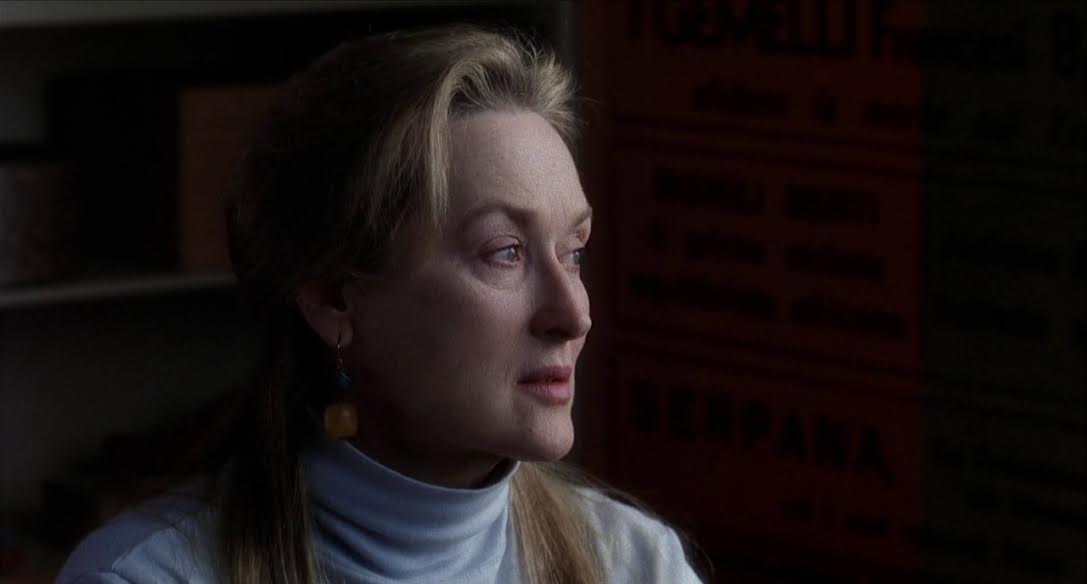
#29 —Clarissa Vaughan, a higher-up and hostess of the New York literary scene attempting to throw a party for her dying friend.
MATTHEW: Even before Meryl Streep stepped before the cameras as the unraveling hostess Clarissa Vaughan on Stephen Daldry’s The Hours, the actress already possessed a role in Michael Cunningham’s Pulitzer-winning, tripartite meditation on love, loss, and Virginia Woolf. Early on in Cunningham’s 1999 novel, Clarissa, while shopping for flower, catches sight of a movie star who may be Streep or Vanessa Redgrave or, much less excitingly for Clarissa, Susan Sarandon emerging from her trailer with an “aura of regal assurance.” Streep’s ephemeral appearance in what will prove to be one of the most pivotal days of Clarissa’s life signifies, quite literally, the sublime; her quasi-cameo is a perfect encapsulation of one of those chance, indirect encounters with a famous face that we use, with varying levels of embarrassment, to distract us from the mundanities of our daily routine, a glimpse of the extraordinary amid the everyday. That Streep the Star, who was gifted a copy of "The Hours" by Redgrave’s late daughter Natasha Richardson, is removed from Daldry’s film speaks to the many, many excisions that occur within any page-to-screen transfer, but it also informs us that Streep’s cinematized Clarissa Vaughan is simply beyond distraction...
I will always appreciate Daldry’s version as a rare if principally partitioned meeting of three extraordinary screen stars...
Each of them are tasked with entering the soul of a woman who is struggling in her search for a reason to carry on with life and its heaviness: Streep’s Clarissa; Julianne Moore’s Laura Brown, a discontented housewife in 1951 Los Angeles; and Nicole Kidman’s Virginia Woolf, trying her best to keep her demons at bay while brainstorming a new work in the English suburb of Richmond circa 1923.
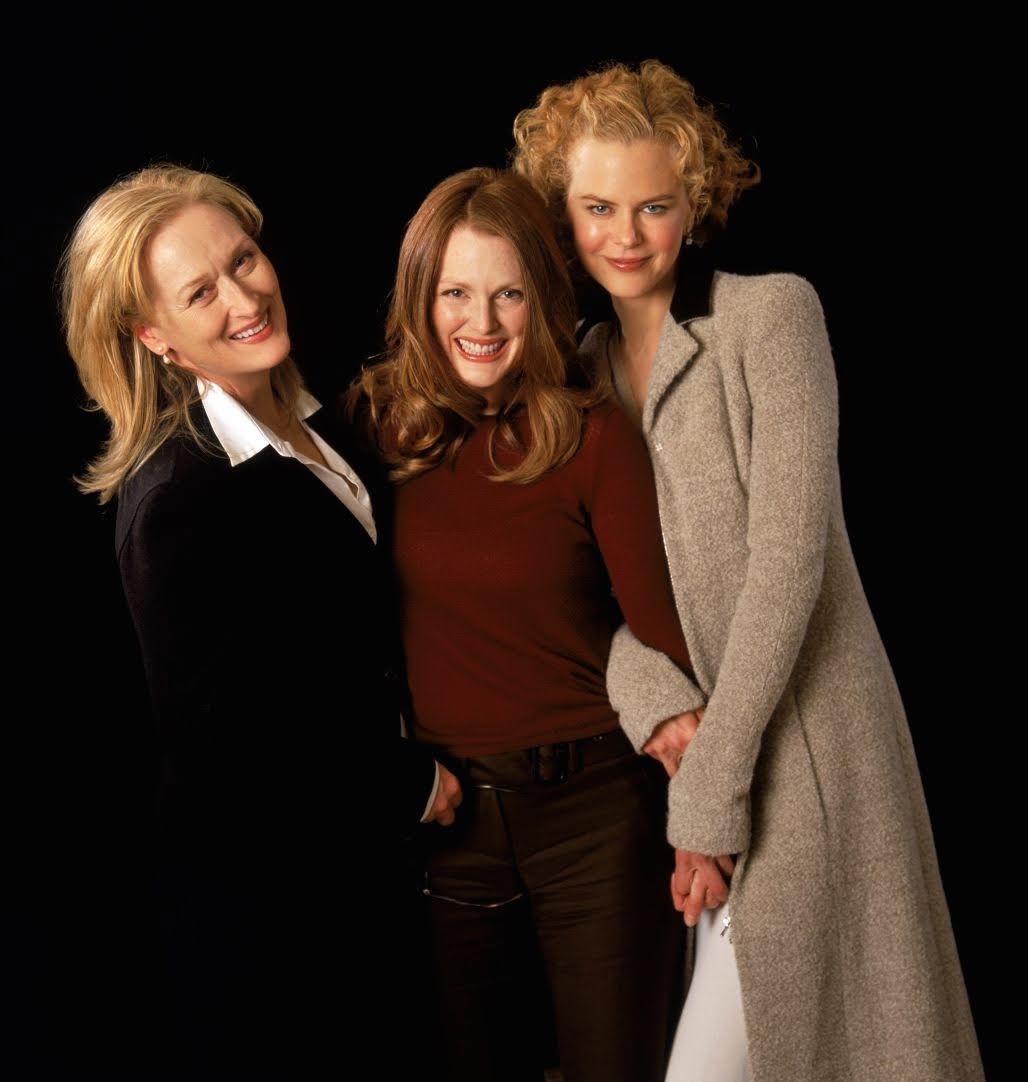
In openly wrestling with Woolf’s seminal 1925 novel "Mrs. Dalloway," Cunningham and adapter David Hare present Clarissa, a bourgeois Manhattan publisher-editor putting the final touches on a celebration for her friend Richard, an acclaimed poet dying of AIDS, as a modern-day avatar of Woolf’s titular society maven. Yet although Clarissa sits beside Laura and Virginia at the center of The Hours, she is marked by a fascinating sadness that somehow sets her apart from her co-protagonists in that its foundation is untraceable, whereas Virginia’s mental illness and Laura’s middle-class inertia are depicted, in some measure, as the root causes of their own unrest. With all of her inexplicable and frequently internalized anguish, Clarissa strikes me as the character in Cunningham’s source text that would prove the most unplayable for any actor, but Streep, who was brought to the project as a seemingly impossible casting coup by producer Scott Rudin, is the performer who, to my mind, comes closest to fully embodying the unbearable, self-confronting contemplation that is the chosen métier of The Hours in both forms.
We first meet Clarissa on the morning of Richard’s party, asleep in the bedroom of her imposing West Village apartment as Sally (Allison Janney), her partner of a decade, creeps into bed after clandestinely returning just minutes before. When Clarissa opens her eyes not long after, the first thing we see is the exhaustion that seems to bleed from her eyes. It’s there, too, in the weary stare that Streep sends out as she peers at herself in the bathroom mirror, a look that appears to ask if she really has the strength to commit to this day. But she does, and it isn’t long before Clarissa is traversing the wintry streets of the West Village, en route to the flower shop, a la Mrs. Dalloway, to get the flowers herself. What remains most masterful about Streep’s work is that it burrows deep within the gray spaces of Clarissa’s psychology, refusing to resolve any of the trivial but truth-telling encounters that define her day.
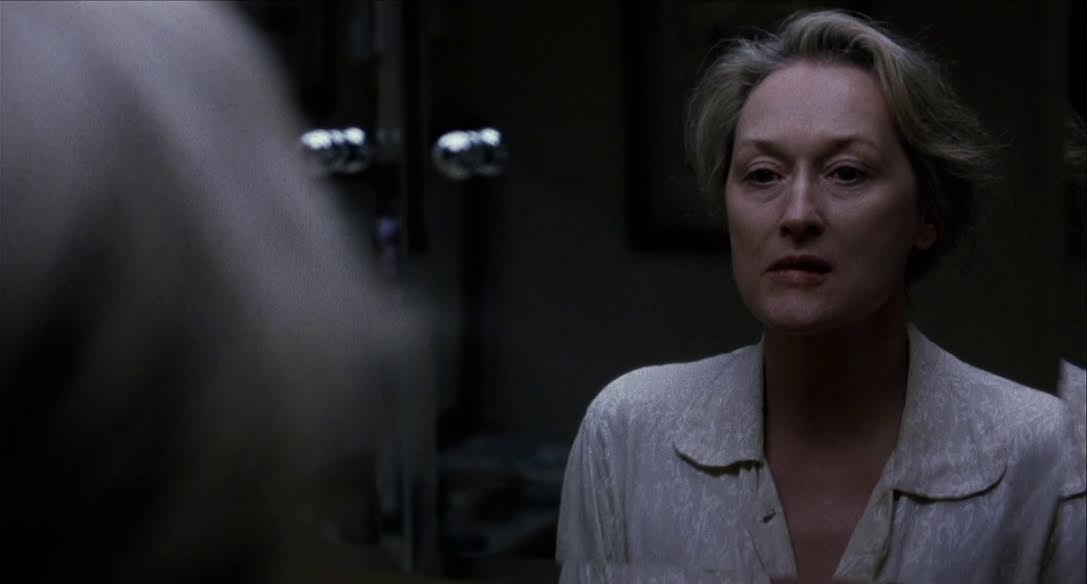
Take Clarissa’s interaction with the florist (played with delicious mischief-making by preeminent Woolf interpreter Eileen Atkins), in which the latter makes unveiled inquiries into whether or not the central character in Richard’s badly-received novel is, in fact, Clarissa herself. “He changes things,” Clarissa gently counters. “And then he makes them his own... I don’t mean in a bad way.” It’s in that last phrase that Streep shows us the two predominant sides of Clarissa: the fiercely loyal friend who is more precious about Richard’s work than, we will soon find out, even he is, but also the nervous self-preserver who knows the book is about her and that this character, an incorrigible party-thrower prone to frivolous pursuits, is perhaps more exposing than she would like.
When Clarissa next goes to Richard’s apartment to prepare him for tonight’s plans, Streep’s own performance is nearly threatened by a crucial scene partner. Harris’ grumbling, one-note interpretation of this profoundly haunted artist rings false but Streep doesn’t need his help to concoct a multicolored panoply of reactions that fleshes out a complete history of Clarissa and Richard’s relationship in all its passive-aggressive pugnacity and loving reassurance. Streep ultimately requires only Hare’s words to show us that Richard is at once a companion and life source to Clarissa, and some of the precisest moments in Streep’s entire performance arrive when one of Richard’s cutting remarks forces Clarissa to privately pause, re-calibrate, and consider her position before quickly rousing herself out of these spells of delayed self-inquiry, stopping just short of taking full stock of the life she leads. Why don’t you take us through the next stages of Clarissa’s crisis, which begets some of the most shattering and awe-inspiring scenes of Streep’s 21st century career?
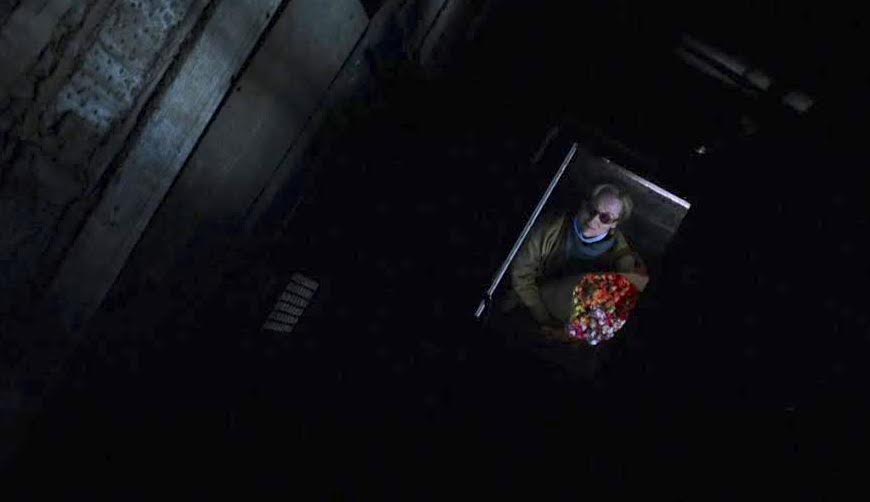
JOHN: Sure, but first let’s ride the elevator. After Richard bemoans the party Clarissa is throwing for him, forcing her to endure such loaded questions as, “Would you be angry if I died?” and recasting her commitment to him as a pathetic character flaw, Streep exits, puts her sunglasses on, and backs up against the elevator wall. Although Streep certainly matches Harris’ anger and fully absorbs his criticisms in their scene, it isn’t until she is finally alone in the elevator that she lets down her guard to show how deeply Richard’s comments have rankled her. This image of Streep, stone faced and exhausted, silent, her eyes shielded and her body upright, reminded me of a description from Woolf’s 1927 masterpiece "To The Lighthouse," in which her heroine Mrs. Ramsay is lamenting all the performativity involved in simply going about her day, yearning instead for the solemnity and solitude of her own company:
“For now she need not think of anybody. She could be herself, by herself. And that was what now she often felt the need of — to think; well not even to think. To be silent; to be alone. All the being and the doing, expansive, glittering, vocal, evaporated; and one shrunk, with a sense of solemnity, to being oneself, a wedge-shaped core of darkness, something invisible to others... and this self having shed its attachments was free for the strangest adventures.”
Streep’s Clarissa never arrives at the latter end of Woolf’s description, as much as her attachments may try to shed themselves of her, but she certainly carves out moments of solitude in which to contemplate the “strange mood” the day has put her in.
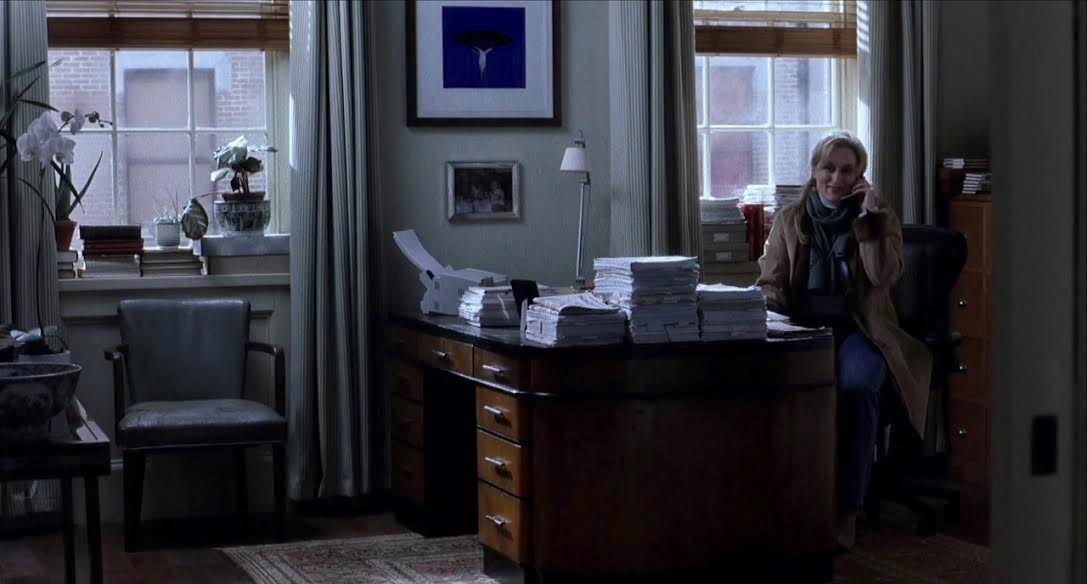
Another perfect tableau: following this battle with Richard, Clarissa sits in her office, dwarfed by piles of books and manuscripts, and looks forlornly out the window, desperate for some solace. When Sally tries to make conversation with Clarissa, she can’t even get up, and instead shouts across the apartment, answering Sally’s questions in clipped, terse responses. Submerged in troubling thoughts that she can barely string into sentences, Streep creates a rich portrait of a woman bogged down in the muddy waters of her psyche with no anchor and no rescue. Betrayed by Richard, unfazed by Sally, Clarissa is utterly alone, emphasized by the shots of her cordoned off in her office. The very fabric of her life is falling apart, and on a day where everything must come perfectly and publicly together.
Streep’s performance hits its absolute peak upon the arrival of a long-lost friend, Richard’s ex-partner Louis (Jeff Daniels), who is both an estranged and a familiar enough presence for Clarissa to confess her despair. Clarissa is blasting opera and preparing “the crab thing” when the doorbell rings and already we sense that this woman is herself a pot on the stove about to boil over. Streep’s nervous energy gets channeled through her cooking, cracking, and separating eggs to the frenetic rhythm of Philip Glass’ score. When the two eventually broach the topic of Richard and his book, Streep doesn’t even bother trying to contain her uneasy mental state. Louis remarks that Clarissa is courageous, to dare to go visit Wellfleet, the site of their summer of love, “to face the fact that we have lost those feelings forever.” Streep makes clear, however, that Clarissa cannot face the fact of her own feelings. She paces around the room. “I’m sorry, I seem to be in some strange sort of mood. I seem to be unraveling,” she admits.
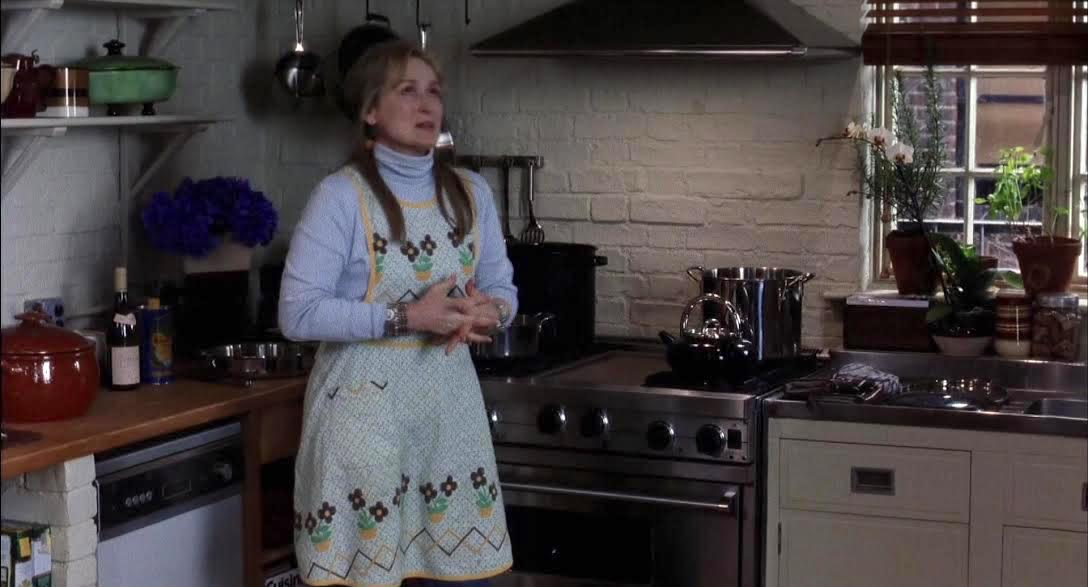
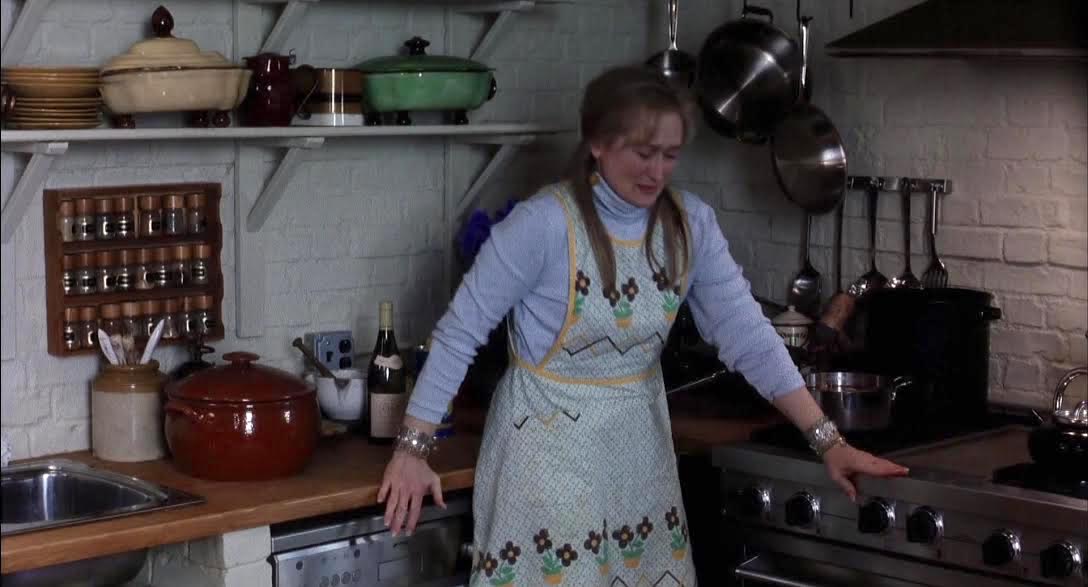
There is nothing misplaced or extraneous in Streep’s performance here; every gesture, look, and movement is completely in service of Clarissa’s breakdown, as opposed to an opportunity for the actress to writhe or sob for the sake of going big. Clarissa resents how Richard has made her feel trivial, but Streep doesn’t render Clarissa’s crisis as trivial in the slightest. Instead, Streep’s performance feels genuinely frightening and unmanageable, steadying herself on her kitchen counter and sinking to the ground in tears, under assault by her sadness.
MATTHEW: Just closing my eyes right now, I can envision with near-perfect accuracy the way Streep’s body hunches forward in this scene, knees buckling, hands urgently clutching the countertop that is her only source of support. It’s almost as if Clarissa is physically repelling the impending breakthrough, so much so that the very line “I seem to be unraveling” feels even blunter and more superfluous than it appears on the page, forcing Streep to verbalize what her body is already viscerally communicating. This scene is a poignant and perfect crystallization of Streep’s objective, which is to expose the fissures in one woman’s confidence, her overriding sense of self.
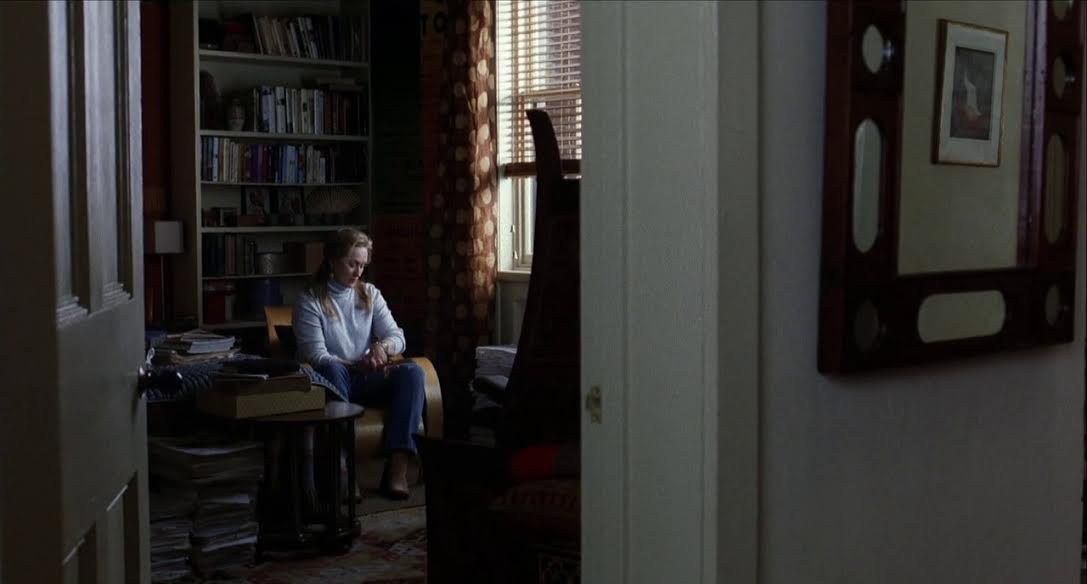
Streep is more understated but just as evocative in her scenes with Sally, as well as the exchange with her daughter Julia (Claire Danes) that follows her kitchen breakdown. I love that Streep refuses to sentimentalize her relationships with either Sally or Julia, which, in turn, asks some interestingly unresolved questions about these peripheral characters, whose psychologies, briefly explored in Cunningham’s work, are entirely extracted here: What secrets is Sally hiding from Clarissa? And what do she and Julia really think about so clearly occupying a lower rung than Richard in her mother’s heart and mind? The emotional distance that Streep maintains between Janney and Danes speaks volumes about Clarissa’s performances as partner and mother, her inability to monitor or accomodate the sensitivities of those closest to her. The cold, unforgiving eyes that Streep casts on Moore’s 50-years-older Laura in the film’s final moments aren’t so dissimilar from the detached way that Clarissa so often regards Sally, and if Julia ultimately breaks through to her mother, it’s only because the latter so eagerly needs an ear to confess to.
The rueful, unironic, and even giggling exuberance that underscores each of Streep’s words in her dialogue with Danes about Clarissa’s last moment of true and unadulterated happiness are a rare moment of clear-sighted self-awareness for the character. Yet the parts of Streep’s performance that hit the hardest are the non-verbal ones, the scenes and shots that could be watched on mute, without the added benefit of Glass’ plaintive score or Hare’s pointed writing, and still galvanize. Richard’s suicide is one of the eeriest horror scenes of the century, and Streep plays it as such, right down to the final close-up that finds her eyes widening and shutting with pale, blood-freezing terror as her reason for being vanishes before her. Just as indelible is the squint that breaks from Streep’s face when Moore, aged-up as Richard’s elderly mother, tells her, “You’re a lucky woman,” four unforeseen words that snap some instinct in Clarissa, forcing her to weigh all that has been lost in her life, as well as what remains. Every head-on frame of Streep throughout this discussion suggests an interiorized revelation that enables the film to conclude her character’s arc as it does, on a note of resilient acceptance and unexpected radiance as Clarissa, practically glowing in this second-to-last shot, shuts the lights in her well-appointed apartment and bids her ghosts a silent goodbye.
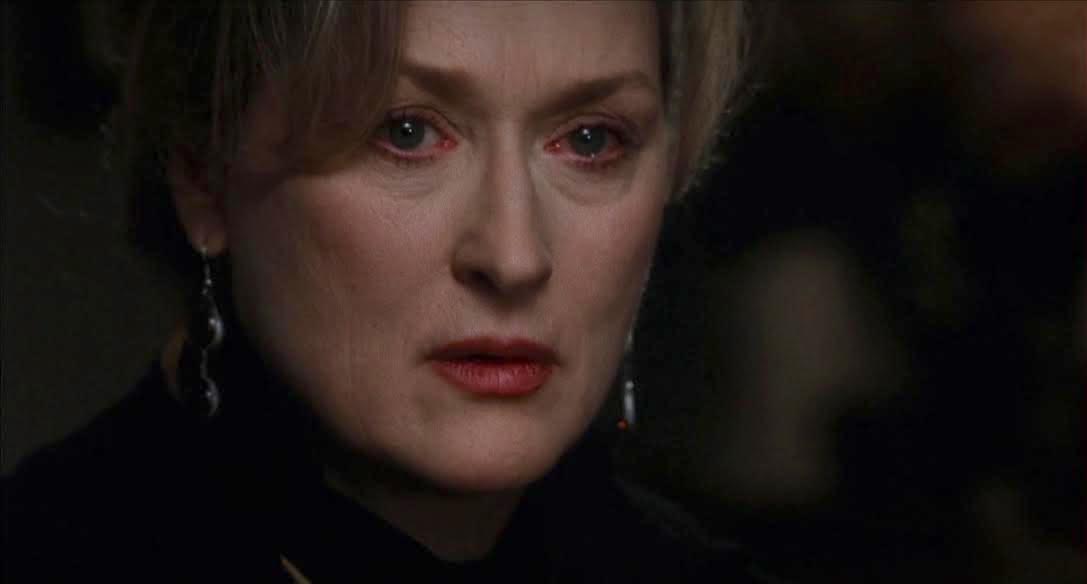
This moment never ceases to startle me, not least because every rattled gaze and stammered line of speech in the performance we have just witnessed has revealed the mounting hopelessness of a woman struggling to keep her life from collapsing. Strange, then, that Clarissa should end not as a sufferer but as a refortified survivor. It’s as if Daldry, Hare, and most of all Streep seem to say that no matter the hardship, Clarissa Vaughan will live to see another day.
This is a performance so full of performative grace notes that continually complicate our understanding of Clarissa, oftentimes within the span of single scene. What other choices of Streep’s do you find the most captivating and complex?
JOHN: As much as Streep’s performance is, as we’ve both discussed, a risky and nuanced feat of a woman’s utter unraveling, few scenes move me as much as the late-film confrontation between Mrs. Brown and Mrs. Dalloway, a scene in which Streep shares the screen with an actress of her caliber (a rare event!) and cedes it almost entirely to her.
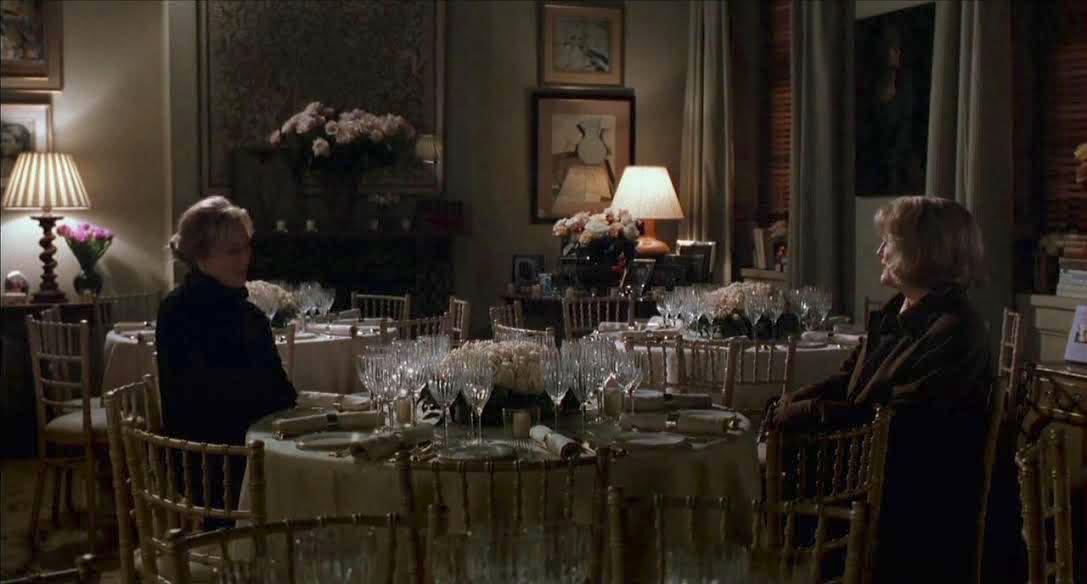
Laura Brown, convincingly aged and played as such by Moore, appears just hours after learning that the son she once abandoned has killed himself. Upon opening the door, Streep takes a few seconds to search this woman out, shocked and intrigued to finally match the real person to the stories Richard has regaled her with over the years. “You’re Laura Brown?” she asks, as if the woman she had pictured can’t possibly match her reality (“So that’s the monster,” Danes whispers to Janney), quickly takes her luggage and directs her toward an eerily empty dining room. Streep cautiously stands back, watching Moore soften the monstrous figure Richard has created, waiting for the horns to shoot out of her head.
Streep begins the scene as withdrawn and suspect as she could possibly be under the circumstances, but as Moore recounts her decision to abandon her children, Clarissa’s attempts to seal herself off are complicated by Laura’s sympathetic truth-telling. “You’re a lucky woman,” Laura tells Clarissa, who narrows her gaze, slightly confused and taken aback. Streep can barely make eye contact with Moore as she retells the story of her leaving her family and fleeing to Canada rather than kill herself. “What does it mean to regret when you have no choice?” Moore whispers. “It’s what you can bear… There it is. No one’s going to forgive me. It was death; I chose life.” Streep’s reaction, circumspect yet increasingly hypnotic, conveys the degree to which these words have stirred Clarissa by limiting all other faculties of her face yet keeping her eyes focused; this reserved expression is almost as unsettling as watching Clarissa grasp for the counter in her kitchen. When she later climbs atop her bed, lets down her hair, and kisses Sally, we can sense that this woman’s life has somehow set a new course.
By balancing remarkable physical control with emotional candor, Streep’s work in The Hours remains one of the most startlingly alive creations in her entire filmography.
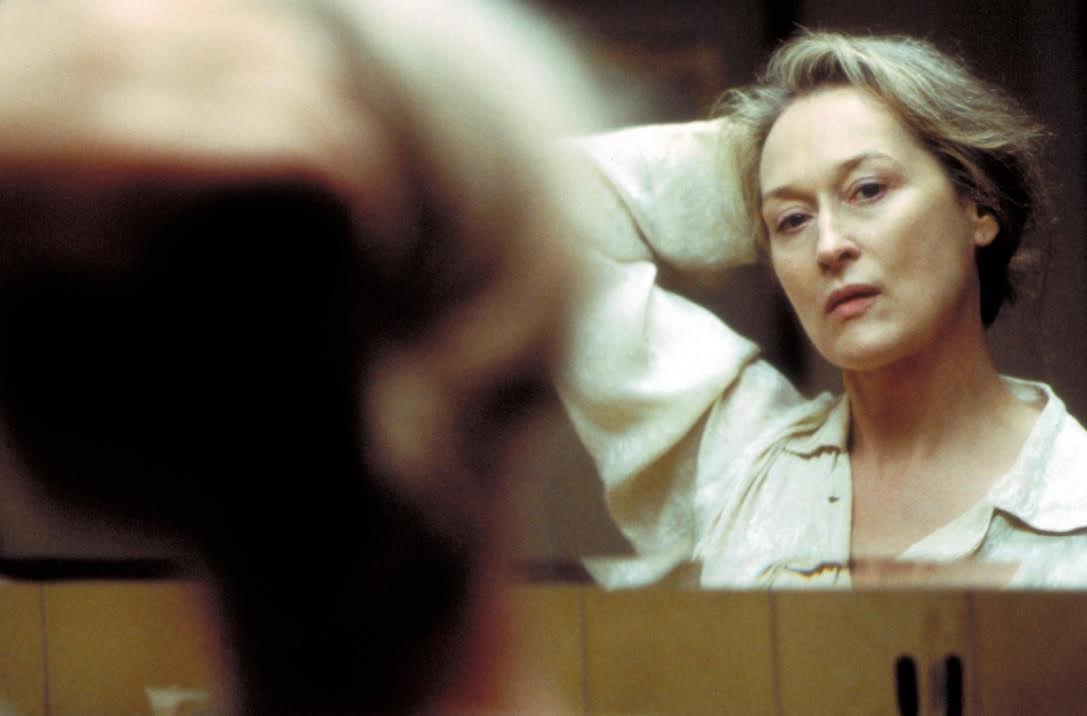
Catch up with 'Months of Meryl'
- Julia (1977)
- The Deer Hunter (1978)
- Manhattan (1979)
- The Seduction of Joe Tynan (1979)
- Kramer vs Kramer (1979)
- The French Lieutenant's Woman (1981)
- Still of the Night (1982)
- Sophie's Choice (1982)
- Silkwood (1983)
- Falling in Love (1984)
- Plenty (1985)
- Out of Africa (1985)
- Heartburn (1986)
- Ironweed (1987)
- A Cry in the Dark (1988)
- She-Devil (1989)
- Postcards from the Edge (1990)
- Defending Your Life (1991)
- Death Becomes Her (1992)
- The House of the Spirits (1993)
- The River Wild (1994)
- The Bridges of Madison County (1995)
- Before and After (1996)
- Marvin's Room (1996)
- Dancing at Lughnasa (1998)
- One True Thing (1998)
- Music of the Heart (1999)
- Adaptation (2002)



Reader Comments (51)
I find the picture insufferably dreary. That said, I actually prefer the Streep scenes to the Kidman/Moore stuff.
my top six meryl perfomances!!
BRIDGES OF MADISON COUNTY
ANGELS IN AMERICA
DEVIL WEARS PRADA
OUT OF AFRICA
SOPHIE'S CHOICE
THE HOURS
So human in 'The Hours'!! Sooooo human!
I always remember Moore and Kidman more in this film than Streep and I think this article explained why to me - Clarissa is vaguer, her problems more interior (besides her struggle with Richard, obviously) and therefore the performance as a whole is more nuanced. Moore and Kidman represent such easily accessible archetypes (the unhappy housewife, the angsty artist) while Streep has to grapple with something much more formless. Of course she nails it.
I especially love the story of how the kitchen sink exploding was an accident and Streep just went with it. It worked so well that they kept it.
Good movie.
REALLY BAD dinner and a movie pre-bedroom date movie.
REALLY BAD.
Very nice write up. This film for me falls in the masterpiece category. There has never been anything like it that I can remember - three strong women in three different time periods played by three of the world's greatest actresses! It somehow works wonderfully, thanks to the screenplay, actors and Stephen Daldry (who did equally great work with Kate Winslet in The Reader). This movie to me is also linked to 9/11, because, if I remember correctly, it happened in between filming. The scene at the end with Streep and Moore is remarkable, and Kidman as noted deserved her Oscar for an indelible portrait of Virginia Woolf. Beautiful film and highly recommend to anyone who has not yet seen it.
Beautiful write-up. While Silkwood remains Meryl's best performance, The Hours is by-far my favorite of her actual movies. Gorgeous, richly acted-even its flaws are fair. It's a terrific picture.
It's quite an interesting film with three great LEAD roles. One writes the book, one reads it, one lives it. I've never seen something like this before.
I've read in film forum's though, that most people don't like Meryl in it, esp. the breakdown Scene in the kitchen. I had no idea. It's quite easy to dismiss it, but it's just as intense as the other characters.
LikeI've said, I personally think all three are great and I'm so happy that all three recieved the Silver Bear for acting at the Berlinale that year.
Why isn't this movie available on bluray?
I was only 11 when this film came out and didn't watch it until a few years later in high school, but ever since that first viewing it has stuck with me. The films exploration of interior struggles meant, and still means, a lot to me.
Depending on where I am at in my life I favor certain performances. Initially Moore's was my favorite performance, then in college it was Kidman's (mainly the train scene), and now I think I fall more for the Streep performance. This article does a fantastic job of summing what is so remarkable and special about her performance. I remember watching the commentary for the film and Streep stating she believed her character was the only one actually asleep at the start of the film. I just love her performance so much. The kitchen breakdown can make me cry just thinking about it. AND I love that Streep was surrounded by not only superstar actresses like Moore and Kidman, but also powerhouse character actors like Janey and up-and-comers like Danes. It is a beloved film for anyone that loves actresses.
Can't wait for the rest of this series! Don't want it to end.
There hasn't been a movie that touched me and stayed with me as much as this one. Blame it on the exquisite writing (novel is a wonder too), the absorbing score (the definition of what a great soundtrack should be/do) but, especially, blame it on its miraculous cast.
Everyone here (even the "cameos": Atkins, above mentioned, Collette, Hanney) is doing some pretty stellar s**t.
Streep was for me the weakest link the first time I saw it. Years later (I think this movie demands some certain experience in that thing of being face to face with anguish, with life overall) when I revisited I have to say I was floored by her, by her preciseness.
One can easily even smell her regret, her rage, her pity, the heat in her skin.
I read somewhere that, in her scene with Daniels, the sink breaking was an un-scripted accident; which only shows how in control of the character and her body language this woman/goddess can be.
And some people dare to say this fella is overrated?
Future generations will forever wonder why one of Meryl's Top 3 performances was also one of the few to fail to grab an Oscar nomination.
She is superlative here and best in show (I nominate her and Julianne in Leading, both lose to Julianne in Far From Heaven).
Nicole is fine but nowhere near my Top 10.
Special mention to Toni Collette too...
I initially read The Hours because Nathaniel recommended it on this site about a year before the movie came out!
I coincidentally then went to a test screening a few months before it opened, and the crowd of us all gave it high marks except for one woman who though it was pushing "the homosexual agenda."
I do remember the scuttlebut when someone submitted Streep's name in the wrong category for the SAG awards, leaving her nomination-less there, and eventually at the Oscars too. That whole season it was a 6-person race for 5 slots, with Moore/Zellweger/Kidman/Lane/Hayek/Streep bouncing around the different groups.
This write up makes me want to put down my coffee and go watch it right now,Streep was the one without a nomination yet is leagues above the nominated actresses Moore who I can't understand in the picture,I'm like Richard I just don't connect with her and Kidman is great again but who is supporting although both are fine but Janney and Danes have too little to do.
Paranoid -- that six person race was frustrating because other great people were right there like Huppert in The Piano Teacher and Gyllenhaal in Secretary and so on.
Excellent write-up, it makes me wanna see this masterpiece again although I've already seen it a dozen times.
Streep is incomparable here, it's my all time favourite Streep's performance, followed by The Bridges of Madison County and The Devil Wears Prada. Genius work, so raw, emotional, heart wrenching. I simply can't explain how much this movie and especially Meryl and Julianne's performances meant to me.
This is such a beautiful tribute to maybe the single most (personally) important performance I ever recall experiencing. For those who had read the novel, the expectations were murky - how was the specificity of the characters' interiority going to be replicated on film? It's the writing, it's the acting, it's the direction, that score. But the performances, I mean. What is left to be said that you have not yet said. There is so much to relish in each actor in the film, but I have accepted in the 15+ years since first seeing the film that it is Meryl's that carries the treasure and the reward. The life of one woman, all in a single day. Neither of the other stories is built with that challenge -- for Virginia, we see her in the two distinct periods of her madness -- for Laura, we come back to her years after the event of her lifetime, and we even miss that moment. For Clarissa, it has all led to this day, it is all consumed within it, a life's worth of events in broken crystal, all apiece, all astray.
Great write up. i have watched the film over 20 times. at least twice a year since its release. great acting, directing, writing and that score!
I always found this be a very blah movie with phenomenal performances. For all of the arguments that come up that Streep nominations are, to quote Jared Leto, "in accordance with California state law," she seems to usually be in contention in some very competitive years, and 2002 turned out to be one of them, like 1994 and 2004, when the competition was just too strong to give her room to get in. I personally think her performance is far superior to Kidman's winning performance in the same film. Hayek, Lane, and Moore also gave great performances in such poorly received films that the fifth nominee, Zellweger, almost rode the Chicago train to a win, despite thin singing and dancing ability in a musical. Streep's role falls into what Nathaniel (the site administrator, not me) calls the "normal contemporary woman" categorization that gets Streep left out, despite Clarissa Vaughan's very modern family. It's yet another beautiful quiet and understated performance that is too often overlooked come awards season, but I really think it's one of Streep's best.
Awards groups turned an eight-way Best Actress race into a five-way Best Actress race with spillover in supporting. As a result, Streep in The Hours (the one who didn't make the cut) has aged very well.
I slightly resent Moore's work in that movie because her nomination (and Zeta-Jones') blocked Michelle Pfeiffer and Toni Collette. A very tough year.
I noticed the Ed Harris shade in this review,I know there are a lot of people who find him too mannered,any thoughts,since he was the only male nominated as there was a small amount of choices in the film but somehow I found Daniels more believable as a gay man.
Streep hands down is the best of the three leads. The scene at the end when Moore and Streep are together.... Moore does all of the dialogue ( poorly done "acted" ) and Streep just sits there and her reaction ( facial ) to the monologue is awesome. I will watch the movie again, just for that scene.
I tend to remember that for some reason Streep was left off the the Actress nominations list and that is why no nomination for her. I might be wrong!!??
I love The Hours. It's great. I've got it on DVD and watch it maybe once every year. This is a wonderful, deeply observed write up.
Back when this film was released, I was looking forward to seeing it because it included Kidman, Moore, and Streep. Then a good friend saw it first and said she found it dreary and boring.
I didn't know what to expect, so I was pleasantly surprised at liking Streep's section so much.
Most of all, I didn't find it boring at all. As you said, these 3 acts interweave in a way that made sense and was engrossing. But I'm not surprised at the mixed reaction, this film is like marmite, some love it and some hate it.
I don't know precisely where I would rank Streep's performance, somewhere in the top 10.
The Hours is a masterpiece. I remember reading the novel, which is so engrossing, and finding it both perfect and, frankly, unfilmable. How it all came together so beautifully—and indelibly—is a miracle, thanks in no small part to Streep's perf. One question I've had, which I don't know has ever been answered, is about Julia: is she Clarissa's and Richard's daughter? Because her hugging Laura at the end always makes me wonder if she's fully aware of her parentage and, therefore, embracing Laura as her grandmother, or simply showing kindness and compassion to an old woman whose son just committed suicide. Anyway, great write-up. Love the series!
Oh my! The only thing that comes into my mind when I read or think about this film is how on earth did Nicole Kidman win the Best Actress award. Truly undeserving.
Kidman doesn't win Best Actress in 2002 without the one-two punch of Moulin Rouge! and The Others—it's as simple as that. (Tough call, but Lane or Moore get my vote that year.)
goodbar -- what Mareko said. Oscar is so often about Momentum and Nicole Kidman had just made three super acclaimed films back to back to back that were all at least minor hits. That's a lot of goodwill that has to be channeled somewhere
Kidman fucking robbed Julianne Moore.
The Julianne Moore storyline was the least interesting and not really an Oscar worthy performance. Meryl was best in show and certainly should have been Oscar nominated and arguably was win worthy...
Virginia W. -- I love your literature and your Oscar inputs. Couldn't agree more.
As stated above, this film is a masterpiece. Wonderful performances all around with Streep as best in show. Certainly one of Streep's best performances, how did she not receive an Oscar nomination for this? Seems absurd.
My favorite of the three stories was the Virginia one. I remember really liking Nicole Kidman and Stephen Dillane.
The second story had my MVP, Toni Collette. Another wonderful turn by this amazing actress.
I found the third story, the contemporary one, to be dull, leavened a bit by Allison Janney.
I’m suspecting that Meryl’s lack of a Lead Actress nomination had a lot to do with the Oscar octopus arms of Mr. Harvey Weinstein. He was probably gunning for noms for Nicole and Renee and didn’t need the spoiler Streep to split the vote. Oscar season 2003 was ‘Nicole’s turn,’ so Meryl’s 100 times greater performance had to be kicked to the curb. (Probably struck a deal with her for a future Oscar year of her own and we get, ugh, The Iron Lady.). But HW was probably greedy for CZJ in Supporting and gunned for lightweight competition JMoore than Meryl. Meryl was probably getting a nom for Adaptation - so, can’t be nominated twice in the same category, dearie. Rewatching THe Hours is watching Streep’s golden hour. Kidman’s phony nose was too distracting.
Julianne's storyline is essential and that's why she shouldn't be considered supporting at all.
Meryl is better than Salma, but please remember that Huppert was in La pianiste that year.
The Academy saw fit to recognize non-Oscar winners who lost to Halle Berry. Kidman (2002) and Zellweger (2003). I love Kidman's performance (the train sequence is classic Oscar bait / Oscar clip).
I still haven't forgiven the stupidity of the Academy for not nominating Streep that year for Best Actress, because, out of the three, she was the best, and actually had more screen time than Moore and Kidman (both of whom should have been nominated together in Supporting). To make matters worse was the sickening Best Picture win for Chicago over this excruciatingly exquisite masterpiece. Two of the best, most searing hours I relive each and every year.
I love reading these comments and only want to add that imho Ed Harris is quite good. Anyone who went through the AIDS crisis knows that man. It's a heartbreaker of a film but really quite beautiful and affirming, because of Clarissa's decision to forgive and go forward.
Paramount- where is the blu ray for this multi Oscar nominated movie?!?!?
Paramount are notorious for not re releasing or special editioning anything other than MEGA popular franchises and classics,they have forgotten a lot of their film library legacy.
This is one of my favorite films, despite its flaws, and I last watched it about a year ago. Like several here, I read the book prior to the film being released and thought it was sensational. I thought they did an impressive job bringing this to the screen--when I heard about the casting, I initially thought it was too good to be true, but it really turned out well.
This is probably my favorite film that Streep has been in, but I actually prefer the other two leads in this. I found her to be a bit mannered, and the "I seem to be unraveling" scene that most loved I thought was overplayed. Different strokes, I guess? In fairness, I think some of Cunningham's language, while gorgeous, can be quite flowery and dramatic, so it's probably easy for it to translate as over-the-top on screen.
I think there's a bit of revisionist history going on in some of these posts. Saying that "Far From Heaven" and "Unfaithful" were poorly received films is just--well, not true. The former was practically hailed as a masterpiece upon arrival and the latter received generally positive reviews. Also, we'll never know why Meryl wasn't nominated for The Hours, but it's worth entertaining the possibility that a large number of people may have just thought she didn't deserve it for this one. It was a very competitive year in the Best Actress category, and (in my opinion) she delivered a much stronger performance in the Supporting category in Adaptation. I think if Meryl was nominated for The Hours instead of Adaptation she probably would have still lost to CZJ.
Love, love, love this movie.
Kidman deserves her Oscar and Meryl should have also been nominated for this. It's crazy to think that, despite of her record, she never got double noms in a year, like, for instance, Julianne Moore in this same year.
Clarissa is an incredible enigma and we all adore her for it.
I agree that Kidman deserved her Oscar. It was a prickly, searing, wholly original performance. It's unlike anything else in her filmography and unlike any other depiction of depression I can think of.
If she had been snubbed, we'd discuss that performance the way we do Birth, To Die For, The Others, The Paperboy etc. etc. etc. It gets underrated because Oscar actually went for it, and because Moore was so good in the same year. I prefer Kidman by a nose.
I too love Nicole Kidman in this.
"I'M DYING IN THIS TOWN!"
And Stephen Dillane as Leonard Woolf was just as good. I was in tears by the end of that scene in particular.
To me this performance is so natural and rennosents more with me as I have aged myself. I think it is because of a greater understanding of what Clarissa goes through that makes this character stronger now compared to 14 years ago
They all battle life and death. There is a dangerous flirtation about giving in or just go throw it
They all try to escape somehow resulting in various way hurting the once they love the most
My absolute favorite scene is the one between Leonard and Wolf on the train station. So much love, compassion, vanity, regrets, life and unclear future at once. I think this movie next to The Godfather / II and A Streetcar Named Desire, has the most powerful supporting cast in an English speaking movie
I only know this movie because it's how Liz Lemon and Dennis Duffy met on 30 Rock.
"This movie is soo long. They should have called it The Weeks!'
More Words about Toni Collettes greeeeat Turn here please!!!
And Isabelle Hupperts Piano Teacher is the Yeah before I think.
What do you think about my Acting nominees/Winners that Year?
BEST ACTRESS
Selma Hayek, Frida
Diane Lane, Unfaithful
Julianne Moore, Far from Heaven (*)
Meryl Streep, The Hours
Catherine Zeta-Jones, Chicago
BEST SUPPORTING ACTRESS
Patricia Clarkson, Far from Heaven
Toni Collette, The Hours
Nicole Kidman, The Hours
Julianne Moore, The Hours
Michelle Pfeiffer, White Orleander (*)
Moore's nomination is category fraud of the highest order. If any of the leads are actually supporting it's Kidman.
Meryl was truly remarkable here. Such a shame her performance was overlooked by the Academy. The film itself is simply a masterpiece.
Gosh I can't believe I've missed this article! By a mth no less.
I dun really get the movie the first time, only getting the nuances after reading the novel (surprisingly short) n watchin it on dvd a 2nd time. I rem i was most impressed w Moore. This n Far from Heaven cemented her as my Best Actress o 2002! But on hindsight, Streep has the most difficult role to play as her struggles r not so apparent as the other two. And i can ustand y the voters went for the other two more flashier parts. I'm also v impressed w Dillane's Leonard Woolf. Nic owed her win to him! And Moore's owed her nom to the sublime Colette
Oscar trivia:
Althot Nic has the shortest screentime among the three, she insisted on being considered only in the Lead cat (it pays off obviously).
I was thinking had she agreed to go supp, she wld've won over CZJ n Streep wld've been nom in Best Actress but still lost to Zellweger.
But i agreed this is a story w three leads.. It's rather hard to argue who shld've gone supp...Colette, Janney n Danes shld technically be the ones who shld be considered supp.. Well, cat fraud alws cos real supp players precious slots!! 😂
My fav Meryl Streep performance... yet, the one that gets snubed! xD